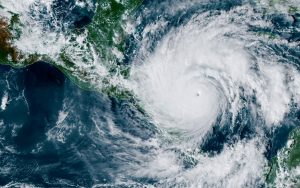Environment: Study Shows Global Decline in Hurricane Frequency
Climate change researchers have constructed a clearer picture than ever of the occurrence of hurricanes over the last few decades and found that the frequency of the planet’s most devastating storms has decreased over the past century.
Published 2 years ago


- Hurricane Iota – 2021 – Image from NOAA
The study, published in the journal Nature Climate Change, found that the annual number of global hurricanes, typhoons and tropical storms — or tropical cyclones, more generally — declined by roughly 13% as the planet warmed during the 20th century.
Scientists found that trend in most of the world’s oceans — except for the North Atlantic, where the number of storms increased.
Tropical cyclones, including hurricanes and typhoons, rank among the costliest natural hazards. Understanding how — and why — tropical cyclone activity is changing globally in a warming climate is profoundly important.
Fewer but More Intense Cyclones?
The lead researcher on the study, Savin S. Chand a senior lecturer at the Federation University in Australia, said that while his team found a drop in frequency, that doesn’t mean storms are becoming less of a threat. However, while there may be fewer tropical cyclones in the future, it is likely they will be more intense, he said.
Writing in Nature Climate Change, Savin S. Chand and fellow researchers report their reconstruction of a global, long-term record of tropical cyclone frequency stretching back to 1850 and identify significant downward trends over the twentieth century.
Their analysis shows that the global tropospheric environment has become increasingly hostile to tropical cyclone formation over the past century, driving this decline. Tropical cyclones are born from ‘seeds’ — tropical waves or rotating clusters of individual thunderstorms — over a period of hours to weeks.
This occurs at low latitudes over warm tropical oceans and, usually, at least 1,000 km from the Equator, where planetary rotation is sufficient to aggregate convective activity into a coherent vortex. Once formed, tropical cyclones typically move westwards and polewards before reaching the mid-latitudes, where a cooler ocean surface weakens them or they transform into extratropical weather systems.
Climate change is expected to affect the thermodynamic conditions that engender tropical cyclones, altering the frequency, intensity, spatial distribution and seasonality of these storms. Quantifying historical trends and projecting changes over the coming decades remain subjects of intense research.
Globally, researchers have identified poleward shifts in the latitude at which tropical cyclones form and reach their maximum intensity and an increasing proximity of storms’ maximum intensity to coastal regions. Therefore, geographical shifts in where tropical cyclone landfall can occur may be already spreading risks to regions previously seldom hit. The proportion of intense tropical cyclones has increased over recent decades and the number of North Atlantic tropical cyclones reaching the mid-latitudes may also be rising.
Chand told the CNN website that research into tropical cyclones was so important because they can lead to such devastation.
“The climate is changing, and humans are the major cause and contributors toward that change,” Chand said. “So understanding all extremes in the context of climate change is very important, and tropical cyclones are one of those extremes that has very severe implications on society.”
To read full details of the report see the following link:
Tropical Cyclones – Global Decline in Frequency (Nature.com)
……………………………………………………………………………………………………………………………………….
Related News:
Hurricane and typhoon numbers decreasing in every ocean basin – except for one (CNN)
Atlantic Hurricane Season 2022 – Above Normal Season Predicted (Noonsite)
……………………………………………………………………………………………………………………………………….
Related Links:
Related to following destinations: Global
Related to the following Cruising Resources: Environment, Hurricanes and Tropical Cyclones, Weather




